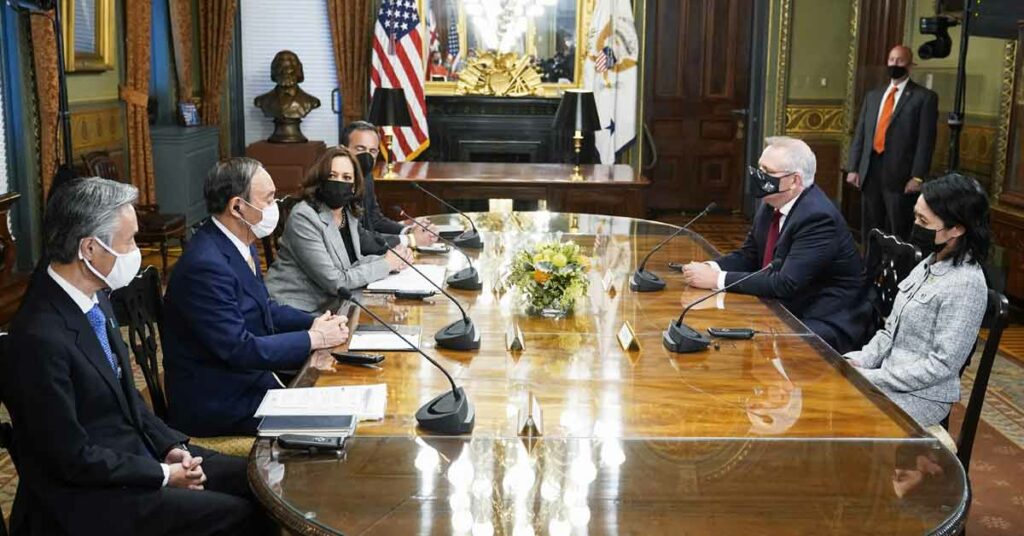
Just recently, Australia signed a new security pact with the United States (US) and the United Kingdom (UK) called AUKUS and for the first time, the US will provide Australia with nuclear-powered submarines. Australia confirmed the purchase of eight nuclear submarines from the US, much to the mortification and vexation of the French who were under the impression that their submarine deal with Australia was already sealed and secured.
The French have expressed that such action from Australia is “regrettable,” saying it contradicts “the letter and the spirit” of cooperation between the two countries. France lost around US$66 billion from the deal to supply Australia with a dozen diesel-electric submarines.
According to US President Joe Biden, the trilateral pact is needed to maintain a “free and open Indo-Pacific” region in view of the current strategic regional environment, while Australian Prime Minister Scott Morrison said the submarine pact will provide “the desired substantial capability enhancement that Australia has needed” and help the country “build regional resilience.”
Although none of the leaders of the three countries mentioned China during the presentation, it is obvious that the alliance is designed to counter not only China’s growing political and economic influence in the Asia-Pacific region but also its growing modern defense capabilities. In many ways, AUKUS like the QUAD is a “counterbalancing security alliance of the “three eyes” against China.
The QUAD or Quadrilateral Security Dialogue is an informal strategic dialogue that is maintained by talks between member countries the US, Japan, Australia, and India.
US Pivot To Asia Strategy
In an attempt to counter China and to realise the aspiration of the US Pivot to Asia strategy, the US has also rejuvenated the QUAD.
Like the QUAD, AUKUS is part and parcel of the shift in US foreign policy from being Middle East centred to Asia Pacific focused; from “War on Terror” to “Great Power Rivalry against China”. All these are embodied in the “American Pivot to Asia” or what is known as the “US Strategic Rebalance to Asia,” under the Obama administration that was renamed as the Indo-Pacific Strategy (IPS) under the Trump administration, which is now being pursued by the Biden administration.
The rebalance to Asia strategy is the US’ response to the ever-changing and very dynamic geopolitical context and environment of the Asia Pacific region which have been driven by significant developments such as the rise of Asian economies with China as the frontrunner, and the inevitable rise of China as a regional power in Asia and beyond.
The overarching narrative of the US rebalance to Asia strategy is indeed driven by the compulsion of realpolitik in contemporary times with China being identified as the number one threat to the US’ hegemonic standing in Asia and the world.
In many ways, the strategy is not only fastened to the idea and the belief that the centre of gravity for US foreign policy, national security, and economic interests is shifting towards Asia from the Middle East, but it is prefixed on the recognition that the Asia-Pacific would play an increasingly important role in driving the world’s political and economic life in the 21st century. The US would like to take advantage of these opportunities to boost economic growth at home, to reassert its influence and leadership in the region while trying to preserve its global hegemony.
The US rebalance to Asia strategy has three components – economic, diplomatic, and military-security. Militarily wise, the US plans a large-scale redeployment of its military power in the Asia Pacific region. To note, in May 2018, Secretary of Defense James Mattis announced the renaming of the “US Pacific Command” to “US Indo-Pacific Command.”
Hence, since the launch of its strategic rebalance to Asia strategy, the US has been looking for ways and means to boost US military presence in the Asia Pacific region and explore ways to disperse US security forces beyond Northeast Asia.
The US has been exploring the possibility of moving some of this presence closer to Southeast Asia. This has prompted a mix of reactions among countries in ASEAN with speculations that the military-security component is the main goal of the US rebalance to Asia foreign policy.
Military-security-wise, the US has also been heightening its efforts in the establishment of new and the reinvigoration of security alliances with its existing partners in the region as evidenced by the successive visits of high-ranking US officials to many Asian capitals.
Likewise, the conduct of Freedom of Navigation Operations (FONOPs) of US, UK, and QUAD members’ warships in the Indo-Pacific region is part and parcel of the US grand Indo-Pacific strategy. And AUKUS in many ways is a realisation of these objectives.
ASEAN Reactions To AUKUS
Like the QUAD, AUKUS is nothing more than a narrower, security-centric effort of the US alongside the UK and Australia to counter China. This is precisely the reason why ASEAN countries like Malaysia, Thailand, Indonesia, and Vietnam are critical and less likely to support AUKUS because it risks fomenting divisions among Asian countries, and might potentially provoke a nuclear arms race in the Asia-Pacific region.
For instance, Malaysia is saying that this alliance will provoke an arms race, and goes against the idea of an ASEAN region that is nuclear-free, a zone of peace, and a zone of freedom and neutrality.
Indeed, AUKUS, in many ways, is in variance with the purpose and intent of the Southeast Asian Nuclear Weapons Free Zone Treaty (SEANWFZ), a treaty signed by ASEAN member states on 15 December, 1995 as a commitment to preserve the ASEAN region as a region free of nuclear and other weapons of mass destruction.
Likewise, AUKUS to some degree is an anathema to the ASEAN “Zone of Peace, Freedom, and Neutrality Declaration” signed by the Foreign Ministers of ASEAN in 1971 in Kuala Lumpur, which envisions an ASEAN region free from interference by outside powers, practicing peaceful coexistence and preserving the independence and sovereignty of individual states.
AUKUS may even result in China exerting greater efforts to enhance and ramp up its military deterrence capabilities. Other countries in the region may also be provoked to do the same. Such a scenario would in many ways endanger the peace and stability of Southeast Asia and the wider Indo-Pacific region. As what Malaysia’s elder statesman Mahathir Mohamad has said, the defense pact between the “three eyes” has escalated the risk of armed conflict in the region.
Mahathir in an interview recently said, “This agreement indicates you openly regard China as a possible enemy and that if it comes to the crunch, you might even go to war. Just imagine what war would do to Southeast Asia.”
Thus, the possibility for ASEAN countries like the Philippines, Malaysia, Vietnam, Indonesia, and Singapore being caught in the cross-fire between China and the US is a very real concern.
Further Implications
Likewise, AUKUS to some degree might also weaken the Treaty on the Non-Proliferation of Nuclear Weapons (NPT) of 1968. The treaty explicitly prohibits the transfer of nuclear technology for military applications. The coming into fruition of AUKUS has to some degree also shaken the transatlantic alliance between the US and its Western European allies. This could probably lead to a recalibration of NATO (North Atlantic Treaty Organization) from being heavily fastened to the US to a more standalone NATO steering away from US influence.
With the abrupt withdrawal of US troops from Afghanistan recently, and the creation of AUKUS which is seen by France as a “stab in the back,” many European leaders could be reassessing their strategies based on the opinion that the US may not be a reliable partner anymore.
Furthermore, European and Asian leaders alike could be pondering on the impression that nothing much has changed with US foreign policy from Trump to Biden as it still orbits around the notion of “America First.”
With the sale of nuclear submarines to Australia by the US under the approving eye of the UK, it is but imperative to ask, who benefits the most from this? Is it the American people, Australians, British, or Asians? Or is this just another arms mega-deal that benefits the huge military-industrial complex of the US?
Conclusion
With the raging COVID-19 pandemic and the need for economies in the Asia Pacific region to bounce back from the devastation caused, countries like the Philippines do not need another QUAD or AUKUS to further accelerate the growing rivalry between China and the US in the region.
Rather, countries in the Asia Pacific region must emphasise common interests, strike a middle ground amid conflicting interests, and seek greater value in win-win cooperation in maritime affairs, regional connectivity, pandemic response, mitigating climate change, economic cooperation, and achieving the United Nations’ sustainable development goals (SDGs).
Countries in Asia need to broker a stable balance of power through a combination of multilateralism and bilateralism and must do away with unilateralism and the creation of “cliques” or groupings with the sole purpose of singling out one country. Instead, they must work to promote peace, stability, and prosperity in Asia and the world in general.
Source: The ASEAN Post
https://theaseanpost.com/article/three-eyes-security-pact-aukus-or-ruckus



